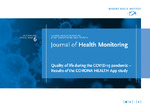Quality of life during the COVID-19 pandemic – Results of the CORONA HEALTH App study
Eicher, Sophie
Pryss, Rüdiger
Baumeister, Harald
Hövener, Claudia
Knoll, Nina
Cohrdes, Caroline
The COVID-19 pandemic has brought about great changes to the everyday lives of the population in Germany. Social
distancing, working from home and other measures to contain the pandemic are essentially dominating everyday life.
With data from the CORONA HEALTH App study we analysed the quality of life of the adult population in Germany during
the COVID-19 pandemic and identified possible risk factors for a poor quality of life. In the app-based survey carried out
between July and December 2020, 1,396 respondents (women 46.5%, men 52.7%, diverse 0.9%; mean age (mean)
42.0 years (standard deviation=13.4)) provided information on their quality of life using the World Health Organization
Quality of Life Questionnaire (WHOQOL-BREF). Univariate and multivariate regression was used to examine differences
in quality of life between different groups of people during the COVID-19 pandemic and their associations with selected
predictors. In summary, women, younger persons and job seekers or those who saw their work hours reduced or who
could not pursue their regular jobs presented a lower quality of life in individual areas of life than the respective reference
group. On the other hand, a setting that combines working from home and at the regular workplace, as well as living
together with other people, showed partly positive associations with quality of life. The results have implications for public
health interventions as they highlight groups requiring closer attention and sufficient support services.
Files in this item

